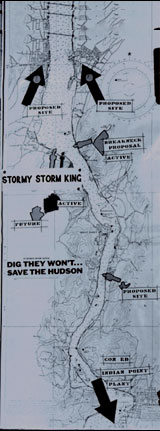WEBSITES
E-Law: What Started It All? U.S. Law & Policy . 5 May, 2000 . Natural Resources Defense Council. 11 March, 2006
http://www.nrdc.org/legislation/helaw.asp
This is the website for the Natural Resources Defense Council, who attributes the beginning of environmental law to the Storm King Mountain controversy. In their “What Started it All?” section, they give a brief synopsis of the Storm King case.
“History of Power Plants on the Hudson : Hudson River Settlement Agreement.” Biodiversity: The Facts . 2002-2006. Riverkeeper, Inc. 11 March, 2006
http://riverkeeper.org/campaign.php/biodiversity/the_facts/565
Riverkeeper is an organization that strives to maintain the cleanliness of the Hudson River for drinking and recreational purposes, as well as fighting for the use of better technology so the amount of fish kills by plants along the Hudson are reduced. Riverkeeper has a legal team, and visitors to the website can report a polluter and further action will be taken. Within the website the give a brief history of the beginning of Environmental Law, the Storm King Mountain controversy.
Sierra Club, Atlantic Chapter: Series Description . 31 May, 2005 . University Libraries: University at Albany , State University of New York 11 March, 2006
http://library.albany.edu/speccoll/findaids/apap130.htm#series
The Atlantic Chapter of the Sierra Club was involved in the Storm King case, and their documents now reside at SUNY Albany archives. This series description shows that the collection holds documents on the Storm King case, specifically, documents that were submitted to the FPC for review by Consolidated Edison, Scenic Hudson, and the Sierra Club in 1967-1968.
“Stephen Duggan's Storm King Mountain Legacy.” Living On Earth. 27 November, 1998/2006 . Living on Earth and World Media Foundation. 11 March, 2006
http://www.loe.org/shows/shows.htm?programID=98-P13-00048#feature2
Living On Earth with Steve Curwood is a weekly environmental news and information program that airs on the radio. The website's archives hold all of the shows that have aired on the radio. In 1998 Mr. Curwood interviewd Robert Kennedy Jr., an attorney for the Natural Resources Defense Council to discuss Steven Duggan, who had recently passed away. The two discussed the legacy Mr. Duggan left behind in the Storm King Mountain case. Mr. Kennedy recaps for the listeners what the Storm King Mountain case was about, and how it played out, and the specific role Mr. Duggan played in the entire case.
Talbot, Allan R. “The Case for Environmental Mediation.” Mother Earth News .” 1983/2005. Ogden Publications, Inc. 11 March, 2006
http://www.motherearthnews.com/library/1983_July_August/
The_Case_for_Environmental_Mediation
Mother Earth News is a magazine on the environment. In 1983 an article was published in the magazine by Allan R. Talbot that encouraged the use of environmental mediation, which the author believes is a superior and successful way to solve environmental court cases. To help support his opinion, he discusses four court cases that were successfully solved through environmental mediation, one of them being the Storm King case. Allan Talbot has also written a book on this subject, and this article is a very good synopsis of what the books goes into greater detail about.
“U.S. Supreme Court/ Scenic Hudson Preservation Conference v. Federal Power, 407 U.S. 926 (1972)/ 407 U.S. 926 Scenic Hudson Preservation Conference et al. v. Federal Power Commission et al. No. 71-1219/ City of New York v. Federal Power Commission et al. No. 71-1220/ The Sierra Club And Its Atlantic Chapter v. Federal Power Commission et al. No. 71-1221/ Supreme Court of the United States June 19, 1972.” Find Law for Legal Professionals . 1994-2006. Thompson Find Law. 11 March, 2006
http://caselaw.lp.findlaw.com/scripts/getcase.pl?court=us&vol=407&invol=926
FindLaw is a website designed for legal professionals. One section of the extensive websites gives examples of notable court cases. On this particular website, the Storm King case is portrayed by displaying the Supreme Court ruling that was handed down in the 1672 petition of Scenic Hudson vs. the Federal Power Commission. There was one dissenting judge in the ruling, Judge Douglas, and the following ruling explains the reason for his dissenting opinion. Judge Douglas did not believe that the Federal Power Commission had fulfilled its obligations that had been set forward in the National Environmental Policy Act of 1969. The judge believed that the FPC was negligent on three aspects of the case, the water supply, air pollution, and the environmental impact, as well as relying solely on the evidence and alternative methods of producing power that was brought forward by the environmentalist groups, rather than searching for evidence and alternatives of their own, even though they are supposed to represent the public good.
Yardley, Jonathan. “The Currents of History.” Washingtonpost.com . 1 November, 2005/1996-2006 . The Washington Post Company. 11 March, 2006
http://www.washingtonpost.com/wp-dyn/content/article/2005/10/31/AR2005103101785.html
This is a book review written in the Washington Post on the book The Hudson , by Tom Lewis. The author of the book review believes that it is a wonderfully in-depth book that gives a thorough history of the Hudson River . Mr. Lewis discusses the Storm King case in his book, as well as its defeat.
|


















